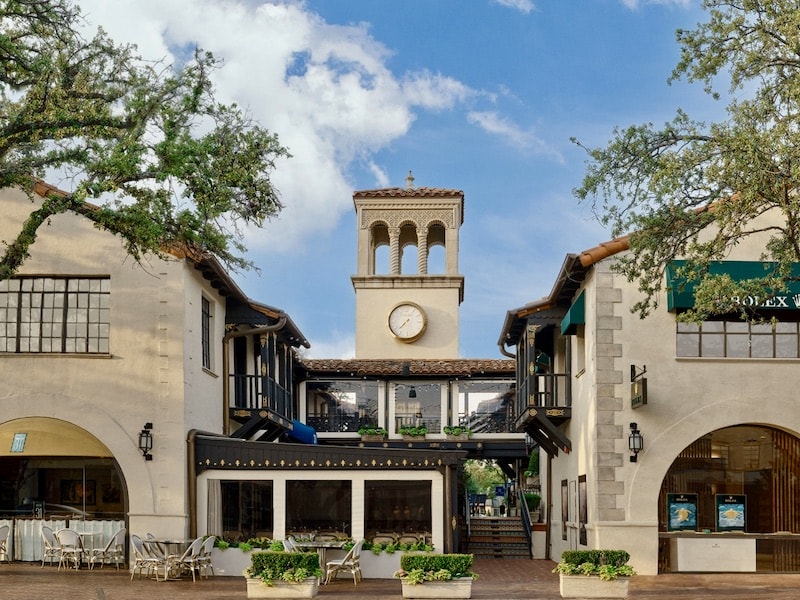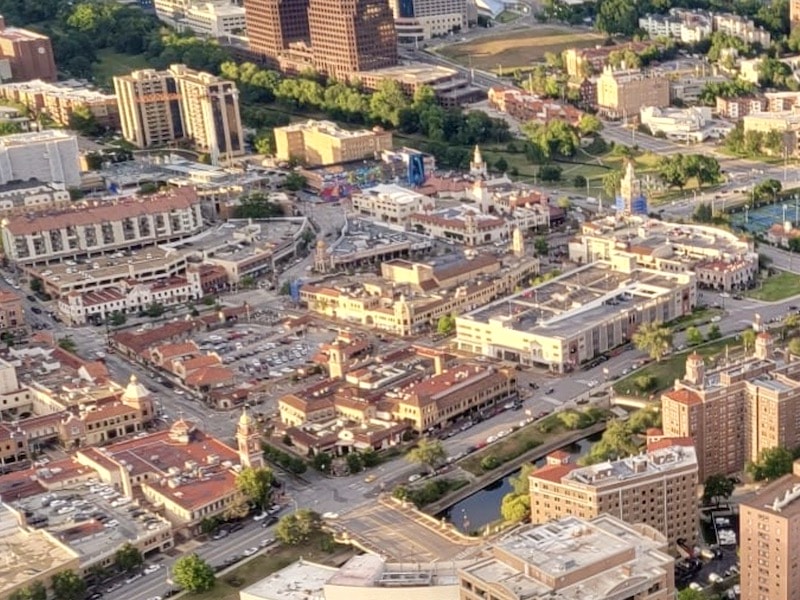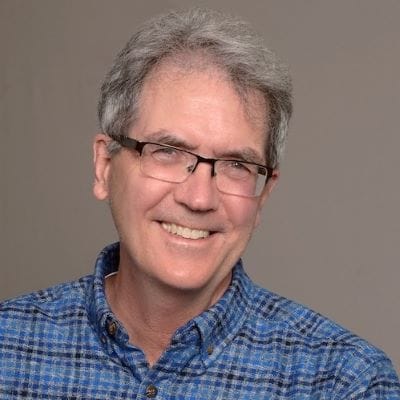Likely Plaza Owner Envisions ‘European Village’ Experience

Published November 20th, 2023 at 12:30 PM
By Kevin Collison
The new Plaza District Council hosted its public debut last week, and Kate Marshall, one of its founders, saved the most illuminating news for last.
For the first time, Ray Washburne, the prospective owner of the Country Club Plaza, outlined some of his ideas for reinvigorating the 100-year old civic landmark via a phone call with Marshall.
“He was very keen to tell me this is really important to him to preserve the historical, architectural, beauty and quality of the Country Club Plaza,” she told an audience of 150 people gathered at Unity Temple.
“That he cares about bringing in local restaurants and local companies that will take ownership so that every little tenant is like a mayor of the Plaza.”
Washburne, president and managing director of Highland Park Village in Dallas, and his firm HP Village Partners has an agreement to purchase the Country Club Plaza and is currently reviewing the property. A closing is anticipated before year’s end.
He could not be reached directly for comment.

The Highland Park Village shopping center was built in 1931 and is listed as a National Historic Landmark (Photo from Highland Park Village website)
But in a follow-up interview with CityScene, Marshall expanded on her conversation with Washburne, providing more details about his plans for the Plaza.
“He said all the retail properties he manages are pristine and Kansas City deserves nothing less,” she recounted from notes she kept of their phone call.
“He used to operate a Mi Cocina restaurant on the Plaza (he owns that chain) and as a result is very familiar with the kinds of problems our older buildings have with plumbing, sewer smells, deferred maintenance, etc.
“Ray full expects to spend millions bringing the Plaza back and enhancing and improving…He’s just trying to understand how many millions.

Kate Marshall
“Due diligence is happening now which includes his people checking out the roofs, garages, sidewalks, towers and tile-work and more.
“Ray’s a fan of locally owned restaurants and bringing back the local feel (30 percent of the shops at Highland Park Village are locally owned). He’ll lean into the European village-type experience.
“He understands that the retail mix needs both high-end and more ‘approachable’ shops. He cares a lot about bringing back a great local food scene, music, cafés, etc. ‘I’m a Jane Jacobs-William H. Whyte kinda guy,’ he told me.”
Jacobs was a famed urbanist who wrote the landmark book “The Death and Life of Great American Cities.” Whyte was a fellow urbanist known for identifying what makes vibrant public spaces and author of “The Social Life of Small Urban Spaces.”
Marshall’s revelation about Washburne capped a half-hour meeting at which the Plaza District Council rolled out statistics that emphasized the underlying strength of the venerable Plaza shopping district and the larger area around it.
The Plaza District Council was formed earlier this year in response to concerns about the future of the Plaza itself and a surrounding area that’s bounded by The Paseo, State Line Road, 43rd street and 55th street.
Dennis Strait, an architect at Multistudio and member of the District board, said the organization is patterned after the Downtown Council, a private group of business and property owners.

The Plaza District Council considers a three-square mile area centered on the historic shopping district as its area of interest. (Photo from Plaza District Council)
He attributed the revitalization of greater downtown Kansas City in recent years as being significantly due to the Downtown Council championing the area.
“We appreciate the lessons learned from the Downtown Council and we’re trying to pattern after those,” Strait said.
Marshall said the organization has raised about $125,000 in private donations so far to pursue its mission.
Matthew Mellor, board chairman, presented statistics that he believed demonstrated the strength of the approximately three-square mile area his group considers as the Plaza District.
It includes 20,000 residents with a median income 15 percent higher than the metro area, 50 percent with college degrees. About 15,000 people work there and its three universities have a total of 18,000 students.
Mellor added the area is the largest generator of sales and property taxes per acre in in the metropolitan area.

The 177-room Cascade hotel recently opened at the Plaza at 46th Terrace and Wornall Road.
As for tourism, the Plaza area has 2,500 hotel rooms. An estimated 6.6 million people visited during the first six months of this year, one-third from outside Kansas City and half that number beyond Missouri and Kansas.
“Only the stadium complex has a higher percentage of out-of-state visitors than the Country Club Plaza,” Mellor said.
“It’s easy to get wrapped up in the narrative about such and such retailer is moving from the Country Club Plaza to someplace like Town Center Plaza,” he said. “It happens, but I think it can easily distort the bigger picture.”
“The bigger picture is the Plaza District is a vibrant economic engine, it is a powerful economic magnet. The future of this District is very bright and that bright future is very important to our community as a whole.”
Strait cited a parks proposal that would extend the Brush Creek Parkway east to the Blue River, saying the corridor could be a new “Central Park” for Kansas City. He also said the new streetcar extension scheduled to open in 2025 should be a major boost to the Plaza.
“This is the most significant investment our city has made into our city since we began reinvesting in downtown and its a great opportunity for this Plaza District,” he said.
Strait encouraged the audience to envision a Plaza that should have an even better future than the one opened by J.C. Nichols in 1923. For many of its early years, the Plaza was considered off limits to people of color.
“We have the opportunity for the next 100 years to be different from the first 100 years which built a great community but it wasn’t for everybody,” he said.
“We have the potential for the Plaza District to be more vital, more connected and to be more of a place that’s shared by everyone.”


